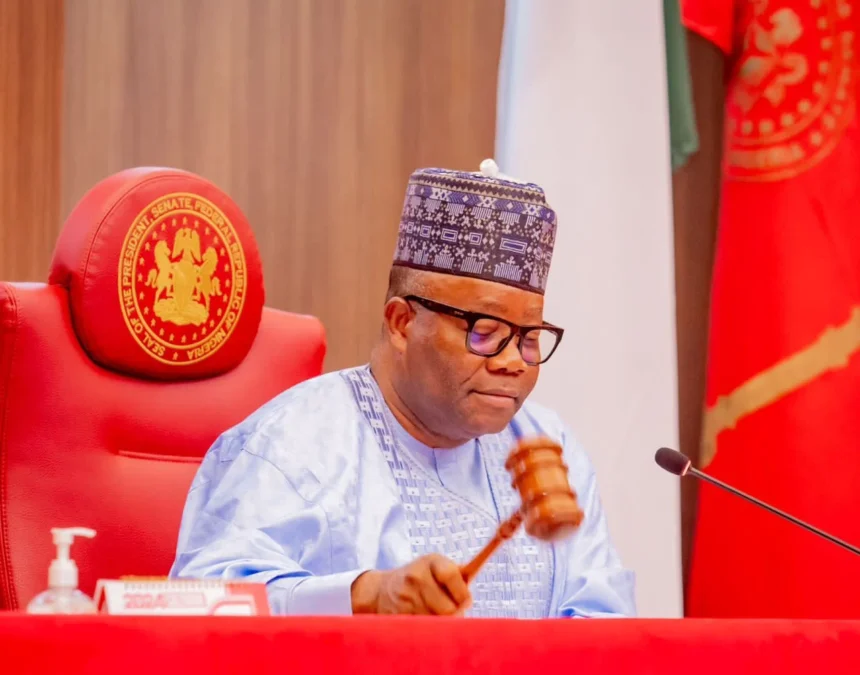The Senate President, Godswill Akpabio, has called on the government of Nigeria and indeed African continent to dismantle what he described as the colonial economic model that encourages export of raw materials and import of finished products, saying this is hampering the nation’s economic growth and development.
According to him, Africa does not need sympathy but change of strategy, rooted in policy, anchored in law, and driven by collaboration.
Akpabio spoke on Tuesday in Abuja through the Chairman, Senate Committee on Science and Technology, Sen. Aminu Iya Abbas, in his address while declaring open the 3-day Africa Raw Materials Summit 2025, with the theme: “Shaping the Future of Africa’s Resource Landscape” and organized by the Raw Materials Research and Development Council (RMRDC) in collaboration with other partners.
The summit attracted Vice-Chancellors, Scientists, technocrats, top government officials, and other stakeholders brought together to proffer solutions to some challenges of the African continent.
Senator Abbas, who represented the Senate President at the event, however, disclosed that the long-awaited 30 per cent value addition bill before the National Assembly would be passed into law by the Senate this week.
The Senate President lamented that it was paradoxical that Africa, a continent immensely rich in mineral, agricultural, and energy resources, remains underdeveloped in the midst of abundance.
He said: “We extract, yet others manufacture. We export in raw form yet import with added value. This extractive model—fuelled by colonial legacies and sustained by global asymmetries—must now give way to a new paradigm rooted in local processing, regional integration, and sovereign economic vision.
“In the Nigerian Senate, we have resolved to be proactive in addressing this structural imbalance. It is in this spirit that I reaffirm our full legislative backing for the 30% Minimum Value-Addition Bill, currently under consideration. The bill will be passed in the Senate this week,” he stated.
Akpabio explained that the groundbreaking bill mandates that no raw material of Nigerian origin shall be exported without undergoing a minimum of 30 per cent local value addition — whether through processing, refining, packaging, or industrial transformation.
He added that the legislation is not intended to stifle trade; rather, it is designed to ignite domestic enterprise, create jobs, attract capital, and build resilient value chains that benefit our people.
“This bold initiative aligns with a broader continental vision. We must reject the historic pattern in which Africa merely supplies inputs while others reap the benefits of innovation, branding, and global market control.
“The future of Africa lies not beneath our soil—but in what we do with what lies beneath. And what we do must be backed by law, driven by policy, and sustained by enterprise,” he stated.
The Director-General and Chief Executive Officer of Raw Materials Research and Development Council, Prof. Nnanyelugo Ike-Muonso, earlier in his welcome address, said the summit provides a platform to unlock the full potential of the nation’s resources and drive Africa’s industrial revolution forward.
He commended President Bola Ahmed Tinubu for his unwavering commitment to Nigeria’s rebirth through the Nigeria First policy.
Ike-Muonso highlighted the imperative of the summit, noting that it was a moment where Africa could reclaim its narrative, redefine its destiny, and rededicate itself to transforming raw wealth into real wealth, from the soil beneath the feet through the genius within the people of the continent.
“This summit is not just a dialogue; it is Africa’s proclamation of industrial independence, a renewed consciousness of authentically becoming producers of value rather than exporters of potential,” he said.
Minister of Innovation, Science and Technology, Mr. Geoffrey Nnaji, who was represented at the event, said the summit has sent a clear message that Africa will no longer export its future in raw form. “Our minerals will power industries, our crops will feed global markets, and our youth will drive innovation”.
ALSO READ TOP STORIES FROM NIGERIAN TRIBUNE
WATCH TOP VIDEOS FROM NIGERIAN TRIBUNE TV
- Let’s Talk About SELF-AWARENESS
- Is Your Confidence Mistaken for Pride? Let’s talk about it
- Is Etiquette About Perfection…Or Just Not Being Rude?
- Top Psychologist Reveal 3 Signs You’re Struggling With Imposter Syndrome
- Do You Pick Up Work-Related Calls at Midnight or Never? Let’s Talk About Boundaries







